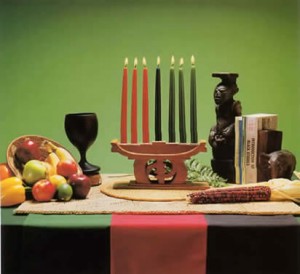Saturday, December 26, 2015
The next two 365 Stories highlight Kwanzaa, a more recent holiday in America that is a celebration of African American heritage. The stories were contributed by student intern Michael Niemiec.
When people think of holidays, they typically consider celebrations like Christmas, Hanukkah, Easter, and St. Patrick’s Day, which been around for centuries. However, there are some relatively new holidays that are less understood, but still celebrated every year. Kwanzaa has been celebrated for only 49 years and was created in America.
The 1960s was a period of social unrest in our country, dominated by many protests against racial inequality and the beginning of Civil Rights Movement. During that decade, race riots occurred across the country. In 1966, after the Watts riots in Los Angeles, Dr. Maulana Karenga, a professor at California State University Long Beach and the chairman of a Black Studies course, tried to find a way to unite African-Americans as a community. He created Kwanzaa, a holiday that would bring African Americans closer to their African roots. The name Kwanza comes from the old Swahili phrase “matunda ya kwanza” which means “first fruits” and the celebration is based on the year-end harvest festivals of the Ashanti and Zulu tribes in Africa. Karenga used the Swahili phrase because Swahili is a common language in several African tribes.
Kwanzaa is celebrated differently from family to family. While some believe that Kwanzaa is a religious holiday like Christmas or Hanukkah, it was envisioned as a cultural holiday. Traditionally the Kwanzaa celebration includes candle lighting, songs and dance, African Drums, storytelling, poetry reading, and a very large traditional meal. Both Kwanzaa and Hanukkah share the ritual of lighting candles each night during the celebration. Kwanzaa has seven candles that are lit for 7 nights, while Hanukkah has eight candles that last for 8 nights. During the seven nights of Kwanzaa, a child lights a candle on the Kinara or candleholder. The Kinara candles are red, green, and black and symbolize the seven principles or Nguzo Saba that are honored on Kwanzaa. These principles are values of African Culture that help to build and reinforce community among African-Americans. Each day represents a specific principle: Umoja, Kujichagulia, Ujima, Ujamaa, Nia, Kuumba, and Imani.
Umoja means unity: to strive and maintain unity in the family, community, nation and race. Kujichagulia means self-determination: to define ourselves, name ourselves, create for ourselves, and speak for ourselves. Ujima means collective work and responsibility: to build and maintain our community together, to make our brother’s and sister’s problems our problems, and to solve them together. Ujamaa means cooperative economics: to build and maintain our own stores, shops, and other businesses and to profit from them together. Nia means purpose: to make our collective vocation the building and development of our community in order to restore our people to their traditional greatness. Kuumba means creativity: to do always as much as we can, in the way we can, to leave our community more beautiful and beneficial than we inherited it. Imani means faith: To believe with all our heart in our people, our parents, our teachers, and our leaders and the righteousness and victory of our struggle.
Photo: African Kinara
Sources:
https://www.infoplease.com/spot/kwanzaa1.html
https://www.history.com/topics/holidays/kwanzaa-history
To commemorate the City of Troy’s 60th Anniversary in 2015, we will publish a different story each day that highlights a person, discovery, or event that occurred locally, regionally, nationally, or even globally between 1955 and 2015 and that helped shape our lives and our community. We will try to post stories on important anniversary dates, but we also realize that dates are less critical than content and context. We will include the facts related to controversial stories, allowing our readers to form their own opinions. We invite you to read and comment on the stories. Your suggestions for topics are also welcome and can be posted on our Facebook page, www.facebook.com/TroyHistoricVillage. You can also email stories or ideas to the 365 Story Editor at ed@thvmail.org.







